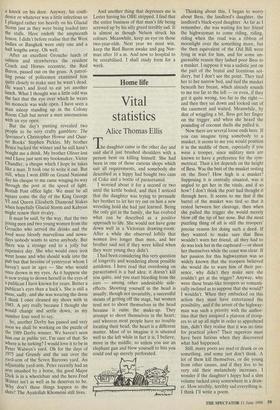Home life
Vital statistics
Alice Thomas Ellis
he daughter came in the other day and said she'd just brushed shoulders with a person bent on killing himself. She had been in one of those curious shops which suit all requirements, and somebody she described as a hippy had bought two cans of Coke and a bottle of paracetamol. I worried about it for a second or two until the kettle boiled, and then I noticed that the daughter was trying to persuade her brother to let her try out on him a new wrestling hold she had just learned. Being the only girl in the family, she has evolved what can be described as a positive approach to life. She would not have gone down well in a Victorian drawing-room. After a while she observed loftily that women live longer than men, and her brother said not if they were killed when they were young they didn't.
. I had been considering this very question of longevity and wondering about possible antidotes. I have read that overdosing on paracetamol is a bad idea: it doesn't kill you quite, and you start bleeding from the ears — among other undesirable side- effects. Shooting yourself in the head is usually, though not invariably, a successful means of getting off the stage, but women tend not to shoot themselves in the head because it ruins the make-up. They attempt to shoot themselves in the heart; and whereas most people have no trouble locating their head, the heart is a different matter. Most of us imagine it is situated well to the left while in fact it is, I believe, more in the middle, so unless you use an elephant gun and blow yourself to bits you could end up merely perforated. Thinking about this, I began to worry about Bess, the landlord's daughter, the landlord's black-eyed daughter. As far as I remember, she was waiting for her friend the highwayman to come riding, riding, riding when the road was a ribbon of moonlight over the something moor, but the then equivalent of the Old Bill were lying in wait for him, and for some un- guessable reason they lashed poor Bess to a musket. I suppose it was a sadistic jest on the part of the brutal and licentious sol- diery, but I don't see the point. They tied her to her narrow bed, and tied the musket beneath her breast, which already sounds to me too far to the left — or even, if they got it quite wrong, too far to the right — and then they sat down and looked out of the casement and waited. Meanwhile, by dint of wriggling a bit, Bess got her finger on the trigger, and when she heard the pounding of coconut shells she pulled it.
Now there are several loose ends here. If you can imagine tying somebody to a musket, it seems to me you would position it in the middle of them, especially if you were a trooper, since military men are known to have a preference for the sym- metrical. Then a lot depends on the height of Bess. Was the butt of the musket resting on the floor? How high is a musket? Supposing it is centrally situated, was it angled to get her in the vitals, and if so how? I don't think the poet had thought it through here. It seems to me that if the barrel of the musket was tied so that it rested between her cleavage, then when she pulled the trigger she would merely blow off the tip of her nose. But the most puzzling thing of all is still the troopers' precise reason for doing such a deed. If they wanted to make sure that Bess wouldn't warn her friend, all they had to do was lock her in the cupboard — or shoot her themselves while the coast was clear. If her passion for this highwayman was so widely known that the troopers believed she would die to warn him of their pre- sence, why didn't they make sure she couldn't get at the trigger? Anyway, why were these brute-like troopers so romanti- cally inclined as to suppose that she would? I wouldn't. When they embarked on this action they must have entertained the possibility, and if the arrest of the highway- man was such a priority with the author- ities that they assigned a platoon of troop- ers to sit up all night in order to apprehend him, didn't they realise that it was no time for practical jokes? Their superiors must have been furious when they discovered what had happened.
Still, many poets are mad or drunk or on something, and some just don't think. A lot of them kill themselves, or die young from other causes, and if they live to be very old their melancholy increases. I wonder if the daughter's hippy had a slim volume tucked away somewhere in a draw- er. How terribly, terribly sad everything is. I think I'll write a poem.


































































 Previous page
Previous page